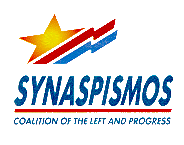 |
SYNASPISMOS and the Amsterdam TreatyExtract of Resolution of SYN's Special
Congress, |
For a European “present”vote in the Greek
Parliament.
The four pillars on which the Synaspismos decision is based.
Synaspismos considers that the outcome of the Amsterdam Treaty falls short of the needs of the citizens of Europe as well as of the demands of our times. There are, of course, steps for the improvement of the Maastricht Treaty in specific areas, especially in the civic rights chapter, but these improvements, judged as a whole, are marginal and difficult to distinguish for the Citizens of Europe. On the other hand, the postponement of decisions which would set a course towards a democratic and social turn in the route of the European Union is both visible and significant.
The retention of the Community budget at an unacceptably low level, the delay in the institutional reforms, the non-existence of a common foreign and security policy, the inadequate steps that were taken at the Luxembourg Summit on employment, the inability to balance the Central European Bank with an economic government of the European Union, are the basic elements which serve to substantiate the above conclusion.
While the Single European Act and the Maastricht Treaty, in spite of the great problems of the latter which we pointed out from the beginning, constituted a step in the developmental process of the European Union, the Amsterdam Treaty does not share this characteristic. This reason, together with the oncoming enlargement, renders imperative the fastest possible revision of the Amsterdam Treaty and the relevant thoughts have already started.
At a time when Europe’s large social and democratic deficits demanded a revision for “more Europe” the Amsterdam Treaty registered stagnation. Without subscribing to the voices that prophesize doom, without accepting the defeatist and dead end view that the road to the European integration has closed, because we believe firmly in this prospect and want to renew the faith of the European working people and citizens to the European vision, we cannot approve the results of the Treaty.
It is on these grounds that the Synaspismos Congress decides that during the discussion in the Greek Parliament the party’s position be expressed with the vote “present”.
This decision includes the following four components:
1. Synaspismos insists firmly on its European orientation and struggles so that the future of the necessary European integration carries the seal of a “Left Europeanism” and its ideas.
2. Synaspismos will struggle together with other forces for the radical revision of the Amsterdam Treaty
3. Synaspismos proposes the non-ratification of a treaty which failed to realise the necessary social and democratic turn in Europe.
4. Synaspismos will vote “present” in Parliament in order to register its reservations and its position for non-ratification of the specific Treaty. The political grounds on which this decision was reached will be contained in a statement that Synaspismos will submit to Parliament.
These political grounds express our will to be present and active in the coming developments. It summarises our decision to reject both passive attitudes and concepts about impasses which end by undermining the route towards a united, federal and socially just Europe as well as strategies of reverting to national isolation by the cultivation of dead end anti- European stances.
A proposal to fight unemployment through a 2,5% cut on military expenses and the increase of the EU’s own funds.
Synaspismos thinks that it is impossible to undertake any European action without the necessary funds. The 1,27% of the European GNP is absolutely insufficient. We ask that the European Union’s funds be increased through a 2,5% reduction in the military expenses of each member – country. These amounts should be used solely for the fight against unemployment and for development. On this basis it is possible to create a very strong mass movement inspired by the best traditions of the Left and the labour movement. If this target is attained it would mean a redoubling of the EU’ s “own funds”. It is thus that the social Europe will meet with the Europe of peace and its message to the other people of our planet will be revitalised.
The Congress authorises the Central Political Committee of Synaspismos and its Members at the European Parliament to convey this specific proposal to the Greek government and the European Parliament and decides to promote it with every means possible and available in order to create a broad movement of support.
Athens, April 5th, 1998